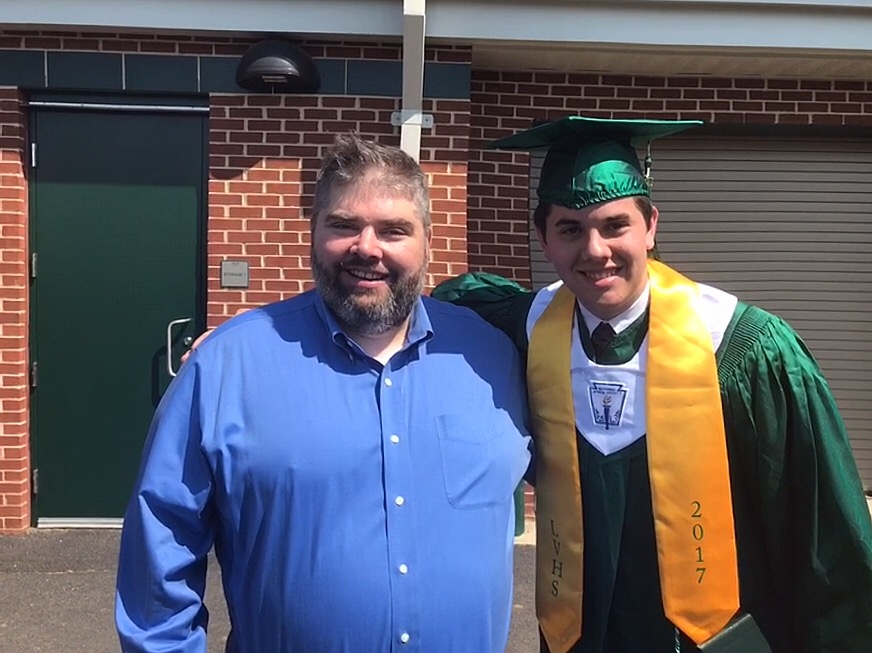
Posted 13 Jul 2017

Editor’s Note: Chris Cerne is a recent graduate from Loudoun Valley High School where he was co-editor of the school newspaper, and has spent the last three years involved with LoudounCodes extracurricular activities. He provided this guest editorial for us.
According to a report by Google, one out of four principals say their school doesn’t offer computer science. This may not seem like a particularly large issue in Loudoun County (in fact, all LCPS schools offer programming curriculum), but there is so much to learn about computer science that it is only possible for computer science teachers to teach the fundamentals of a language.
In my sophomore year of high school, I took my first introductory programming class in Java. This was also the first year that my school started offering the TEALS program, an initiative by Microsoft to connect industry professionals with students. In this class, I met Mr. Bock, a volunteer who was as passionate about teaching computer science as I was about learning it. In the classroom, it helped to have industry professionals answer questions with another perspective, and it made learning computer science more enjoyable. Additionally, we have a computer programming team at our high school and Mr. Bock was glad to set aside time throughout the school year to help us prepare for those competitions. In the summer following my sophomore year, Mr. Bock periodically met with students who were interested in expanding their knowledge of computer science. Specifically, I learned about advanced algorithms (which I would later use to excel in computer programming contests), and Mr. Bock helped another student solder a Z80-based computer. These projects would never have come to fruition without the expertise of an industry professional, who is dedicated to setting aside time for passionate students.
In my junior year of high school, I took the AP Computer Science, which built off of the programming knowledge I had learned the prior year. Using my new knowledge of computer science, I was searching for an internship to make some money over the summer. Mr. Bock was instrumental in providing me feedback for my resume, which helped me land a summer programming internship. The following summer, he additionally had various seminars about programming and engineering that sparked my interest in circuitry. In fact, using my newfound knowledge about electronics, I was able to repair a pair of broken headphones that would have costed a fortune to replace. All of this sparked my interest in majoring in computer engineering, which would have never happened without Mr. Bock’s perspective.
In my senior year, because of the lack of computer science classes at my school (there is only an introductory class and an AP computer science class), I took a class called Independent Science Research, where students are allowed to self-study science or engineering. In this class, I decided to take on an engineering project to combine my knowledge of hardware and software. With a set goal in mind of creating a modular smartphone prototype, I met with Mr. Bock mostly every week to help me create the prototype. In this experience, I perfected my soldering skills, I learned various hardware protocols such as I2C and SPI, and I learned how to program in languages such as C++. Additionally, Mr. Bock taught me more about circuitry, expanding my knowledge from the previous summer. All of this helped me win $250 from the Institute of Electrical and Electronics Engineers (IEEE) at the LCPS science fair, and I am forever thankful for that experience.
In the same year, preparing for the computer programming competitions finally paid off. I have been competing since my freshman year, getting better with every competition. Notably, I competed for the second year in a row at the University of Maryland, where this year we were awarded a third place finish with an award of $900 (even beating the prestigious Thomas Jefferson high school). Additionally, I competed for the third year at the University of Virginia, where our team solved all but one of the problems, earning a fifth place finish out of almost 50 teams. Lastly, I competed for a third time at Virginia Commonwealth University, where we also received a fifth place finish out of 32 teams. Without Mr. Bock’s expertise and support for our team, I doubt we would have been able to make it this far. In conclusion, the software development field is projected to increase by 17 percent throughout 2014-2024. Through organizations such as LoudounCodes and volunteers such as Mr. Bock, we can prepare the next generation of computer scientists to be adequately prepared and passionate about their future career.